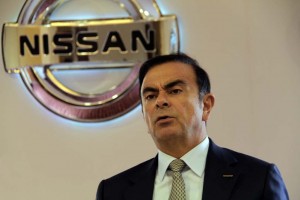Despite spending billions to open new plants in both Brazil and Mexico, Nissan Motor Co. will continue investing in its U.S. automotive manufacturing operations, stressed the maker’s CEO.
But where plants in Tennessee and Mississippi will largely focus on local demand in the United States, Chief Executive Carlos Ghosn said Mexico is rapidly becoming not only its primary export hub in the Americas but likely will soon become a largest export base than Nissan plants back in Japan.
“If you ask me if you will see future expansion in the United States for the U.S. market, the answer is yes,” said Ghosn during a media roundtable in Aguascalientes, Mexico, where he attended the formal dedication of Nissan’s new, $2 billion assembly complex.
The two U.S. plants have steadily expanded over the years and now produce a wide range of Nissan products. They’re also becoming more important export bases with 14% of the vehicles produced in Tennessee and Mississippi going abroad this year – up from 12% in 2012. In fact, Nissan expects to double the number of export markets served by the U.S. assembly lines by 2015, with the Mississippi plant soon to become the sole global source for the next-generation Murano crossover.
That said, the U.S. factories will largely focus on domestic demand, said Ghosn. That reflects the size of the market, Nissan’s ambitions to boost market share from 8 to 10% — and the cost of manufacturing in the States.
(Nissan is betting big on its new Mexican plant. To find out more, Click Here.)
While Nissan officials declined to provide a specific number, industry sources suggest that labor costs for the new Aguascaliente plant and the maker’s two other Mexican assembly lines is about 20% of what it pays north of the border. But another advantage is that Mexico has negotiated free trade agreements with over 100 countries in recent years, a factor that can further improve the business case for using the country as a central export hub.
The addition of the new plant positions Nissan to boost its Mexican production by more than 20%, to a target of at least 1 million vehicles annually by 2015. Significantly, that is coming at a time when the maker steadily ramping down production in its home market.
And with more than 70% of Nissan Mexico’s production earmarked for foreign buyers, “It will make Mexico as important as Japan as an export hub,” noted Ghosn.
Nissan is by no means alone. A wide range of global manufacturers now operates in Mexico with more coming everywhere. Among those currently setting up operations in the Latin American nation or expanding existing facilities are Honda, Volkswagen, Audi and Mazda, and as with Nissan, most of their production is expected to be targeted for global distribution.
If anything, Ghosn and other senior Nissan executives expressed frustration at the slow pace of growth in the Mexican domestic market. Total new car sales are expected to reach just 1.06 million this year, down from a 1.15 million peak in 2005. That represents barely one new car for every 150 Mexican citizens compared to one new car for every 20 Americans this year.
There are a variety of reasons for that slow growth, noted Jose Luis Valls, the managing director of Nissan Mexico, notably including the lack of easy credit for potential buyers. Nissan is trying to address that challenge with its own captive lending subsidiary.
That has, in turn, been a factor in boosting Nissan’s Mexican market share to 24.7%, well above second-place General Motors, at 18.9%.
(Nissan adopts a revolutionary design – and breakthrough powertrain technology – with its BladeGlider Concept. To get a closer look, Click Here.)
During his meeting with reporters, Ghosn addressed several other issues facing Nissan, including the slower-than-anticipated expansion of the battery-car market. The CEO has been one of the industry’s most vocal proponents of the technology – backed up by the launch of the Nissan Leaf electric car.
He suggested the “main” problem is the “slow development of the (public) charging infrastructure” needed to overcome customers’ concerns about the limited range of today’s battery-electric vehicles. In cities around the world where charging stations have become more widely available, asserted Ghosn, “we see sales going up very quickly.”
In comments this past week, the Brazilian-born executive said it will likely take about five years longer than he expected for the EV market to reach sales of 1.5 million vehicles annually than he originally expected.
(For more on Ghosn’s concerns about the EV market, Click Here.)

